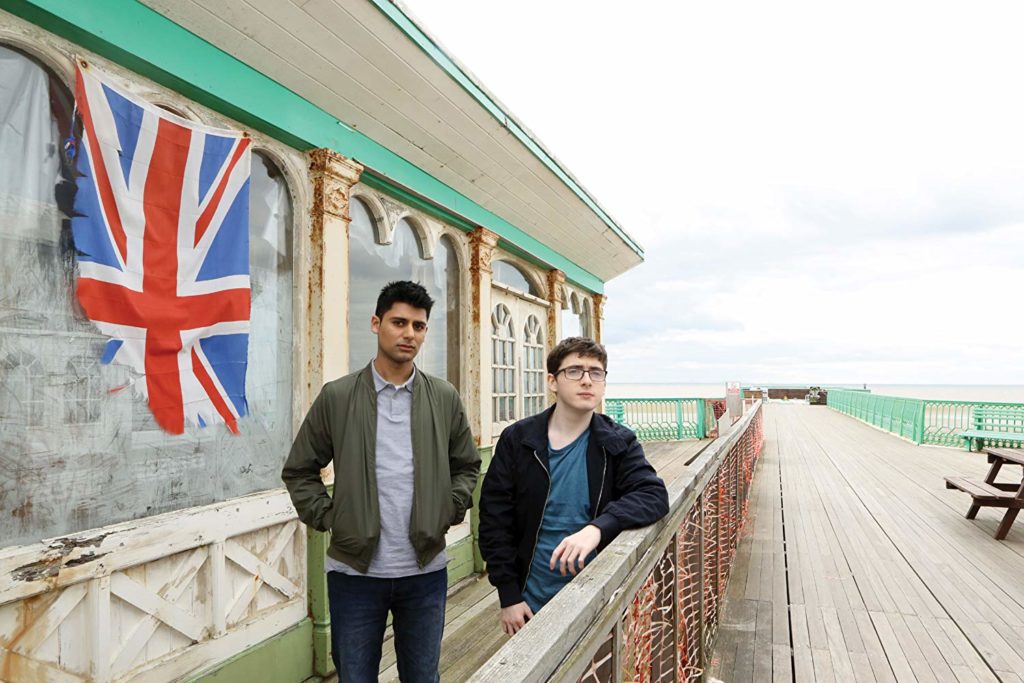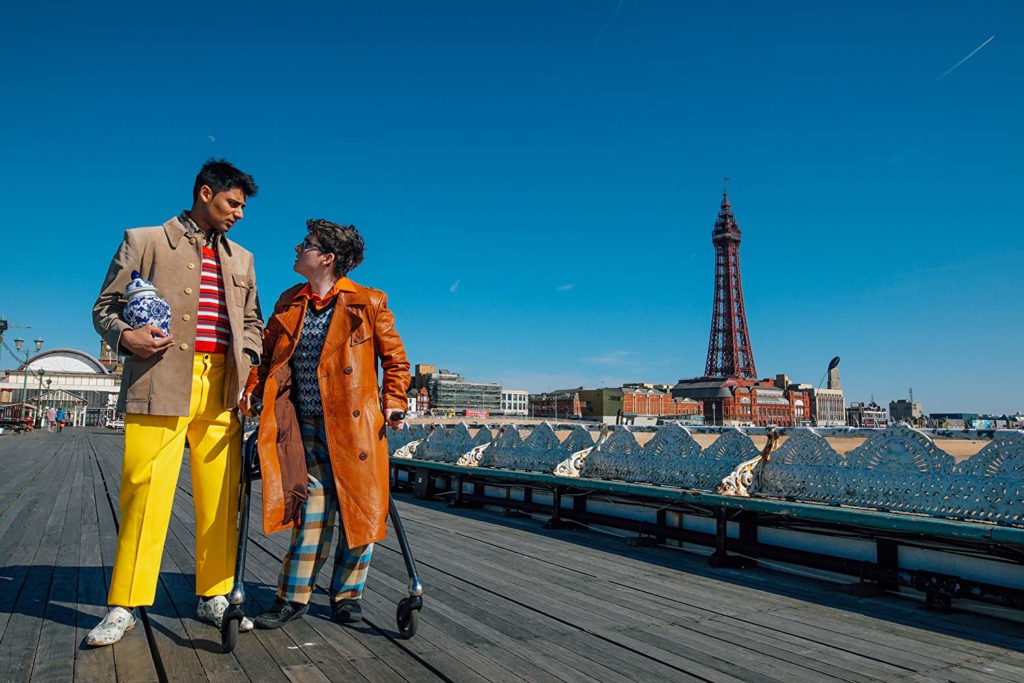Jason Wingard is the director and co-writer of Eaten by Lions, a British comedy that explores themes of family, prejudice and friendship that last month screened at the Edinburgh International Film Festival (EIFF). Wingard talked over the phone with Outtake about his film, talking about some of the influences that went into it and the reasons behind bringing this story to the big screen.

Your previous film In Another Life is very different to Eaten by Lions, but the two are both driven by reunion and family, Why is this a theme that you decided to return to?
Jason: There are a couple of things that we wanted to go over in the films. In Eaten by Lions, we wanted to do a film that was about disability and about culture, but also about family and the importance of family. Jack [Carroll, who plays Pete] has a disability. The way we wanted to deal with it was never to mention the disability, because you can see it. Another thing we wanted to do was with the family is not have religion be the centre piece of the family, something that was vital or driving the characters. So it’s those two things really. In Another Life is a film we shot in the Calais jungle and is much more of an issue-based film. But there are certain crossovers in things that we wanted to say that were going on at the time. There has been a massive rise in racism in the UK and we want to say something about it.
Throughout the film there seems to be an interesting contrast between the very genuine, emotional issues that drive the story and the superficiality of the surroundings – the fake tarot reader, Pleasure Beach, mundane hotels. Was this a deliberate distinction?
J: Definitely. We knew that we were going to have lots of comic cameos. It’s partly to do with the setting as well. We were talking about, me and the co-writer [David Isaac], how you remember things when you were a child, and how you see things through different eyes when you are an adult. For example, a seaside town can sometimes look amazing in your memories from when you were a child – hot summer days, beautiful surroundings. Then you go back and visit them years later and you realise ‘it’s actually not like that at all.’
I can relate to that a lot!
J: That was kind of one of the things, and we wanted the people to reflect that. We were seeing lots of things almost through a child’s-eye view. The idea was to make this film when Jack was about thirteen or fourteen. I think we just got away with it age-wise, but the comedy changes slightly when they get a little bit older. If you look at the script and you look at the way that the film is, you can see that it would have landed slightly differently if he were thirteen or fourteen. It’s impossible to tell now exactly how it would have landed, but I think it would have been different. But that was the original intention anyway with it. We didn’t deviate too much from it. We knew what we wanted to say. Ultimately we just wanted it to be a funny comedy as well.

On the back of that, how would you describe the style of comedy in the film?
J: We were definitely trying to make a comedy. We weren’t doing a comedy-drama. There are lots of gags in there – whether they connect or not is up to personal taste as well. When you watch a film with an audience, you certainly know where the laughs are, and there are no real hiding places with a comedy. It’s either funny and makes people laugh, or it doesn’t. Viewing it on your own is very different to viewing it with an audience. On tone, what we were going for was kind of like a Wes Anderson comedy, where it’s a mildly amusing and charming story, and we shot the film in that way. So that’s what we’re going for. Very much Wes Anderson, and Martin Parr – two references, definitely, all the way through. The seaside photography of Martin Parr is probably an even bigger reference than anything else.
One reason the film works is the strength of the two lead protagonists. How did you settle on casting the two lead parts?
J: Well, Jack we got from Britain’s Got Talent. We were looking for kids who could deliver comedic lines, and Jack is a natural. What we tried to do when we were making the film was draw out his natural personality, and I think we did that. We spent a lot of time with the boys [Jack and co-star Antonio Aakeel, who plays Omar]. We knew that they were two relatively young performers, and Jack [was] not really an actor – more of a comedian than an actor. Antonio we got through much more organic casting; a traditional casting route. It was more about the chemistry between the two of them. We knew that if at any point you queried whether they were brothers, then the film wasn’t going to work. That’s basically how we dealt with it.
And you felt like they ended up working really well together?
J: Oh yeah, without a doubt. I think the chemistry between the two is accepted really quickly, and from about ten minutes in you accept that they are brothers, or at least half-brothers.
They do very much feel like family.
J: It’s harder than you think. Two kids, one has a disability, the other is Pakistani. They look nothing like one another. You have to get the audience to just accept that they are brothers. I don’t think anyone ever questions it, so that is a job done there I guess.

One of the other themes of the film is the effect of prejudice and racism. Were any of the scenes that confronted this difficult to film?
J: Not really. We all understood what we were getting at. Essentially people knew that we were going for that kind of middle England, closed-off view. Particularly with things that have popped up [recently] about race and racism, nationalism and stuff like that, that’s what they – Kevin Eldon and Vicki Pepperdine [who play Ken and Ellen] – expertly represented. Obviously they are nothing like that in real life! But there is a lot of fun in that actually, poking fun at those kinds of narrow views. There is a lot of comedy to be had with that. I actually wish we had spent a bit more time with those characters.
Do you think that exploring such cutting, contemporary ideas in a tried-and-tested format of the British comedy shows that this kind of format, and these kinds of films, very much have a future?
J: Well, maybe. We had our influences, but we weren’t trying to copy anybody. We were trying to say something that meant something to us, to me and David. I think that sometimes a good way to deal with serious topics is via comedy – that old saying of ‘a spoonful of sugar helps the medicine go down.’ It’s tongue-in-cheek. Nothing [in the film] is really taking itself too seriously. It is the kind of film that we intended to make I guess, which was this fun journey to Blackpool via a child’s eyes. There are serious issues that we were dealing with, but we didn’t really overthink it. We kind of thought ‘okay, everyone will know what we’re getting at here, they will make their own minds up from there, won’t they?’
Do you think it’s an important part of the film that the characters are relatable, at least in some ways?
J: Without a doubt. I think with lots of comedy, even if the performances are quite quiet… which they were. They were never deliberately heightened or stylised. There are still aspects of those characters that you recognise, or recognise in people that you know. The funny thing is that nobody ever recognises them in themselves.
How important was it for you to get an EIFF slot for the film, and what kind of reception did it get?
J: These festivals are interesting. Obviously, Edinburgh is one of the [most] prestigious ones in the UK, so it was important for the film to have a good launchpad. It is always interesting with comedy… I think that, from doing a drama and then going into a comedy, I think that comedies are treated very differently. You are never going to satisfy everybody. Loads of people have different tastes. You’ve got to do two things, and it’s a very difficult thing to pull off, because you have got to do the drama of the narrative and also make people amused. It’s two things at once. They never win any awards, and when they go wrong they tend to get completely slated! But we had a lot of fun making this film, and I think that it is well-intentioned. It’s a lot of fun [to watch] as well.
It went down really well in Edinburgh, and we got some fantastic reviews. There is a lot of love for the film from people who have went to see it, and it connects with audiences really well. If there is one thing when you’re making a comedy, you’re not necessarily making it for six or seven critics! You’re making it for a room full of people. That’s kind of how I judged it – I come from a stand-up background and you know if something lands or not if you’re a stand-up comedian. The audiences either laugh or they don’t, you know? Of course in a room of a hundred people not everyone is going to be laughing, but that’s the way it goes with comedies.
How did you make the transition from a hard-hitting drama to a light-hearted comedy? How do you manage that change?
J: I’ve done a lot more comedy work than I have done dramas, so the drama was more of a departure than anything else. I’ve worked with comedians for a long period of time, and lots of them have been regular collaborators. So it was a smooth transition, because lots of these people I had worked with before. Johnny Vegas I’d worked with before, and Tom Binns [who plays the fortune teller] I had worked with before as well. So there are lots of people there that I have worked with.
Do you have a stand-out memory from working on the set?
J: My friend says that you always have little ‘mini depression’ when a film ends. He’s right, because you become so close [with the cast and crew] over a month and then it’s all gone. But of course as a director you stay with a film for seven, eight, nine years. You’ll go from the very early days of development to the very final days of promotion. So there’s lots of things, but we are already moving on to our next projects. It’s been a massive learning curve doing Eaten by Lions – lots of fun, and lots of brilliant people that I would like to work with again.
What are your next projects?
J: I’m finishing a short [film] for The Uncertain Kingdom which is about a homeless man who is sinking into the pavement. It’s kind of like a surreal social issue piece, [with] certain comic aspects, and that’s just completed shooting so we are in post-production for that. And I’m about to go into a block of CBBC children’s comedy, so I’m doing some of that which will be great.
You can read our review of Eaten by Lions here.
Eaten by Lionsis available on Digital Download from 22nd July and DVD from the 29th July
